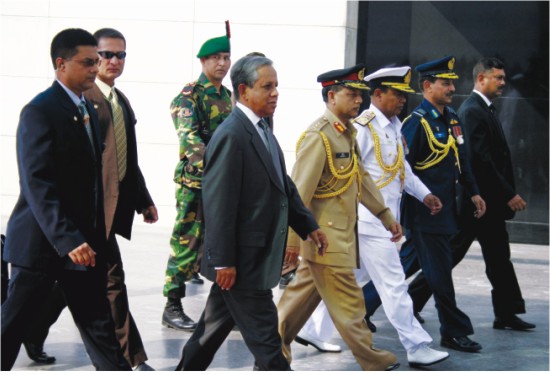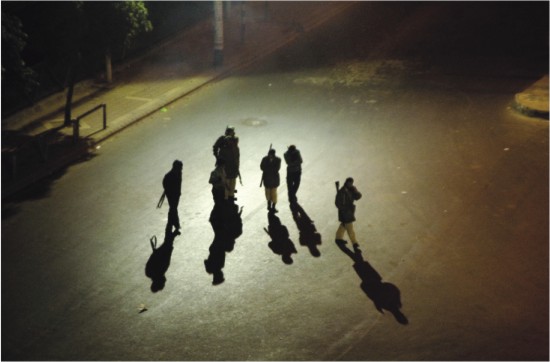
Inside
|
1/11:An Obituary Rumi Ahmed This is not an anniversary piece on the events that took place in Bangladesh on January 11, 2007. Rather, this is an obituary of a thing called 1/11. And unfortunately this obituary does not have much good to say about 1/11. As a political-national event, 1/11 has not been clearly defined yet. There has not been any consensus about what to call the events of January 11, 2007. It was definitely not a popular mass uprising like 1969 or 1990. Whatever it is, the event was definitely a result of violent street agitations by Awami League or deceitful dialog by BNP.
Is it a military coup? May be it was a military coup. But then it would be the first of its kind in our history with tacit support of the United Nations and not so tacit instigation of the Western diplomats. Most likely 1/11 was a new kind of relatively soft military coup, softer than what happened in Thailand, Pakistan, or Turkey, where the senior military leadership work in close liaison with business community, civil society leaders, and the media to bring in a government that will be more sympathetic towards the needs of the urban, educated citizenry. It seems that 1/11 was an attempt in that route. Especially initial minus-two formula, anti-politician and nation building speeches by the army chief, en-masse persecution of the politicians, etc were copycat events of a typical military-civil society takeover. The so-called spirit of 1/11 breathed its last during the weeks preceding the election. That spirit, of a widespread reform and purging, had been inactive, ill and bed-ridden almost all of last year. The unexpected strong resistance from the remnants of the democratic institutes -- political party grassroots, steady resistance by vocal Awami-leaning and other progressive opinion makers, some deft political maneuvering by Sheikh Hasina, and, most importantly, a very timely uncompromising stand by Khaleda Zia helped loosen the military-civil society's grip on the nation. If the achievements of 1/11 are analysed, the grade will be an emphatic fail. Although well organised, the election of December 29, 2008 that was conducted by this government was simply two years too late. Instead of well-intentioned fulfilling of responsibilities, it was the final exit door for this interim entity. And this election is by no means too much qualitatively different from the previous three all-party elections. It was an election for Awami League to win, and two years late, they scored an impressive victory. This government did not do anything, either way, which has uniquely made this outcome possible. Rather it has inflicted some taint to the historic verdict. A caretaker government is constitutionally mandated to create a level playing field for all parties concerned and conducted an election. Even if the allegation of rigging by BNP is ignored, there has been clear evidence that this government has failed in its basic premises, i.e. ensuring a neutral environment. Media reported at least dozens of arrests of BNP election activists disbursing money on the night before election. There may have been many more which has apparently not been reported. One would live in a fool's paradise if one believes that only BNP-four parties have attempted this sort of pre-election night nefarious activity. But few arrests of activists belonging to other parties were made and this is enough to disprove any claim of level playing field. CTG moved from phases based on which party they wanted to favour in the last two years. They first rooted for a bunch of turncoat BNP leaders and took an anti-AL stand, then much later after arresting Tarique and KZ, became anti-BNP, then to anti-AL again when SH left the country, then to pro-reformist in all parties, and then finally to pro-AL. It was all done for the caretaker government's political benefit, not for the country, nor to create a level field. The voter list is another myth the interim entity and their supporters gloated about day in day out. First, the nation heard of the infinite greatness of the voter ID card, then, after spending millions and millions of people's funds and postponing the election by 18 months, the country was told that one does not require the ID card to vote. Then why call it a voter ID card and why so much money was spent? Who will answer for this? Another serious question rises out of this issue. A database of the entire adult population of this country has now been created. Who will keep, protect the privacy of this database and how? What is the guarantee that this database will never be used with political or other ill motives? The evidence of irregularities like ballot stuffing, ballot box hijack, voter intimidation, etc in the recently conducted upazilla election also kills the myth that the new photo voter list is the ultimate touchstone. If a level playing field is not ensured and if there is uninhibited indulgence of old school politics by partisan administration, no voter list, however good it is, would ensure a fair election. The photo requirement for enlisting into voter roll has practically turned this into a de facto US style voluntary voter registration system, which may go against the spirit of our tradition. Even in an advanced and connected society like that in US, there are valid criticisms that a voluntary voter registration system raises the possibility of disenfranchisement of the marginalised segments of the society. Our election rules used to mandate reaching every adult citizen of the country and enlisting them in the voter roll. This interim government introduced the new system that will enforce all the citizens to visit a military run camp to get photographed. This has, very easily, dissuaded those citizens with sickness, or the floating people living in abject poverty, or different groups of people who has genuine fear of visiting an army run camp, from getting photographed and listed on the voter list. The nation has been repeatedly misled about preventing 10 million fake voters. In the past it was customary to include all members of a household on the voter list. Those names included sons, son-in-laws, daughters, and daughter-in-laws, etc who either live in a different household or even out of the country. A significant number of the population used to get enrolled from the urban dwelling home as well as from their country home. The requirement of a physical visit has made the voter registration system unnecessarily difficult, expensive, and prohibitive for many. And that is the reason behind the relative drop in number of voters this time. Another point repeatedly made by the apologists of 1/11 is that this government has finally proven that nobody is above the law in this country. Indiscriminate arrests of high profile politicians including top leadership and keeping them jailed without trial or abuse of other leaders proves a point that a group of citizens responsible for the above-mentioned misdeeds is indeed above the law of the land. Even as far as the politicians are concerned, the current spate of withdrawal of cases by tearful plaintiffs, clearing of almost all cases against politicians, and very recent post-election return of some political leaders out of hiding are clear indications that this group of people are ultimately above the law. One could claim that this government has separated the judiciary, but it would take many years to see the effect. However, the way the highest court and lower courts were used by the interim government for pushing forward its agenda, the claim of separation of judiciary sounds like a joke. Yes, the high court has behaved independently and that had nothing to do with the separation of judiciary. Even during the previous government, verdict of many vital cases went against the government. The cases involving voter roll or the verdict on fatwa are the prime examples. The caretaker turned interim government created on January 11, 2007 outlived it longevity by nearly 21 months. Despite its prolonged stay with fuzzy constitutional validity, this government's practical achievement is ultimately zero.
It is hoped that experience with the heroism of 1/11 will teach us the needed lesson and in the future such ambitions-attempts will be not see the light of the day. In the near future, the nation would like to see a smooth return to our much trusted and praised caretaker government system. Let's finish this obituary with this hope that there will be no more mutated monster to be born out of a caretaker government like the one we just had. Rumi Ahmed, a political observer and a blogger, writes with Drishtipat Writers' Collective. |

